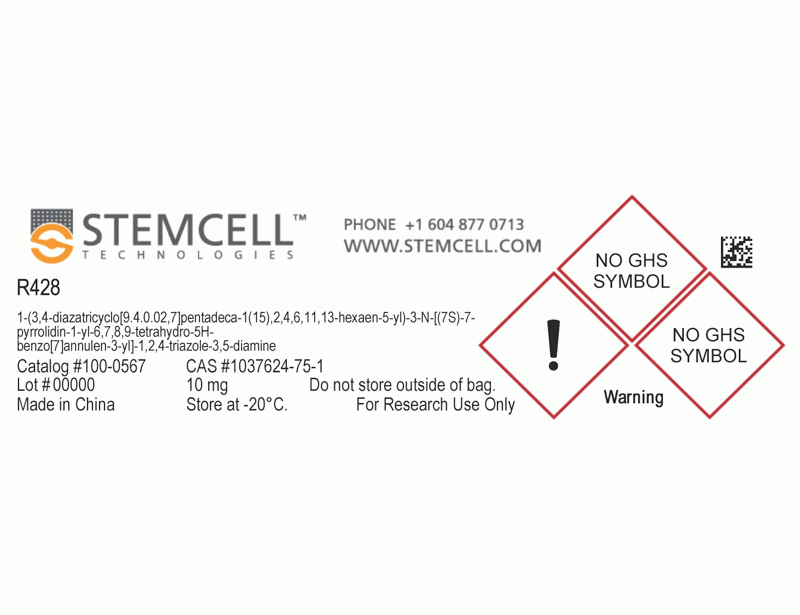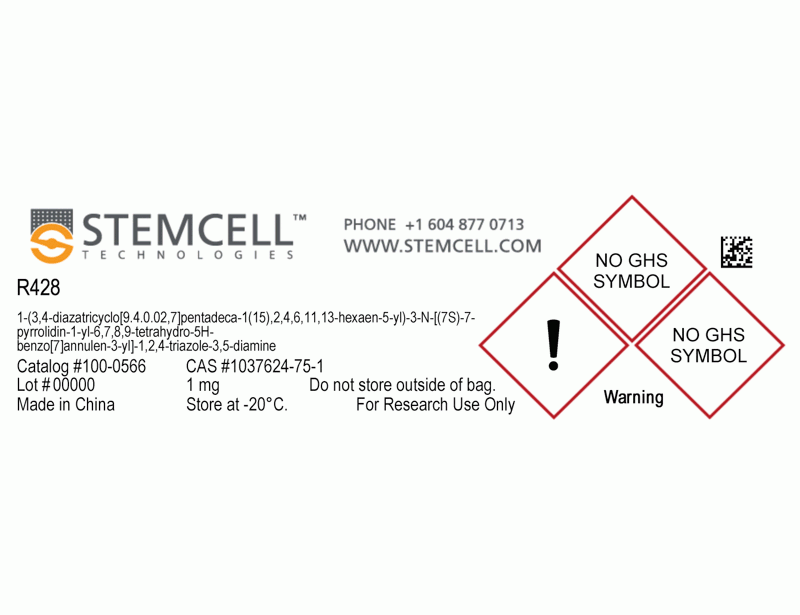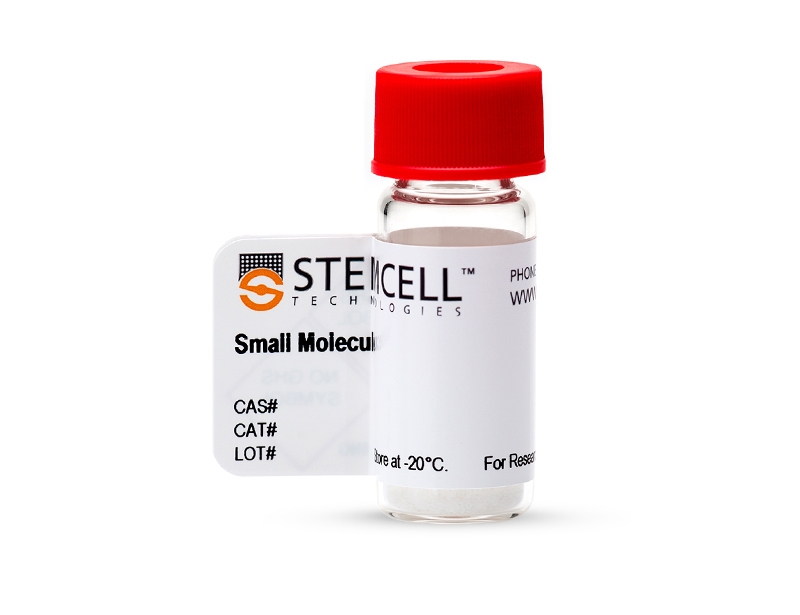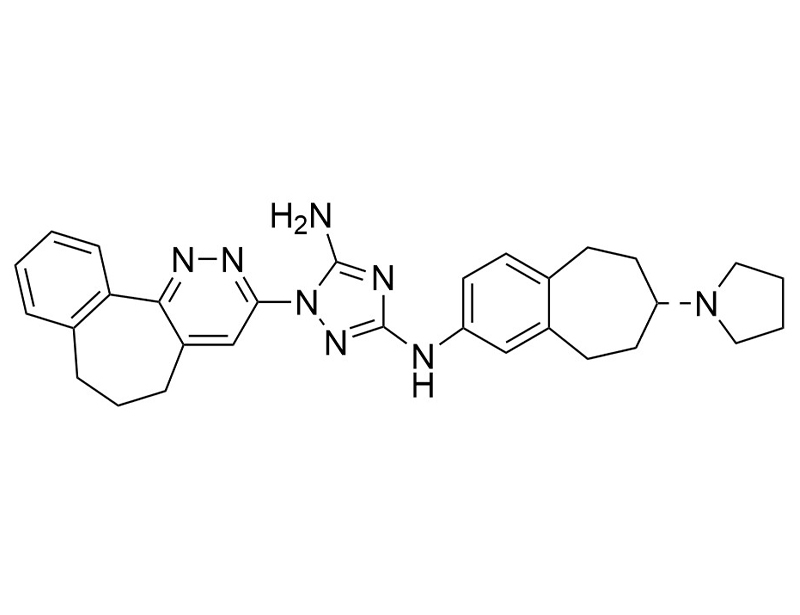概要
R428 is a potent and selective inhibitor of Axl (IC50 = 14 nM) with antiproliferative activity (Holland et al.). Axl is a receptor tyrosine kinase that is involved in cell survival, proliferation, adhesion, and migration (Chen et al.). R428 exhibits over 100-fold selectivity for Axl over insulin receptor, epidermal growth factor receptor, human epidermal growth factor receptor 2, and platelet-derived growth factor receptor β (Holland et al.).
DIFFERENTIATION
· Inhibits preadipocyte differentiation into mature adipocytes (Lijnen et al.).
· Induces beta cell maturation from human induced pluripotent stem cells (Kushner et al.; Yabe et al.).
CANCER RESEARCH
· Inhibits Axl expression and breast cancer cell metastasis (Holland et al.).
· Blocks lysosomal acidification and induces apoptosis in cancer cells (Chen et al.).
DIFFERENTIATION
· Inhibits preadipocyte differentiation into mature adipocytes (Lijnen et al.).
· Induces beta cell maturation from human induced pluripotent stem cells (Kushner et al.; Yabe et al.).
CANCER RESEARCH
· Inhibits Axl expression and breast cancer cell metastasis (Holland et al.).
· Blocks lysosomal acidification and induces apoptosis in cancer cells (Chen et al.).
技术资料
| Document Type | 产品名称 | Catalog # | Lot # | 语言 |
|---|---|---|---|---|
| Product Information Sheet | R428 | 100-0566, 100-0567 | All | English |
| Safety Data Sheet | R428 | 100-0566, 100-0567 | All | English |
数据及文献
Publications (5)
Regenerative therapy 2019 jun
Induction of functional islet-like cells from human iPS cells by suspension culture.
Abstract
Abstract
Introduction To complement islet transplantation for type1 diabetic patients, cell-based therapy using pluripotent stem cells such as ES cells and iPS cells is promising. Many papers have already reported the induction of pancreatic $\beta$ cells from these cell types, but a suspension culture system has not usually been employed. The aim of this study is to establish a suspension culture method for inducing functional islet-like cells from human iPS cells. Methods We used 30 ml spinner type culture vessels for human iPS cells throughout the differentiation process. Differentiated cells were analyzed by immunostaining and C-peptide secretion. Cell transplantation experiments were performed with STZ-induced diabetic NOD/SCID mice. Blood human C-peptide and glucagon levels were measured serially in mice, and grafts were analyzed histologically. Results We obtained spherical pancreatic beta-like cells from human iPS cells and detected verifiable amounts of C-peptide secretion in vitro. We demonstrated reversal of hyperglycemia in diabetic model mice after transplantation of these cells, maintaining non-fasting blood glucose levels along with the human glycemic set point. We confirmed the secretion of human insulin and glucagon dependent on the blood glucose level in vivo. Immunohistological analysis revealed that grafted cells became $\alpha$, $\beta$ and $\delta$ cells in vivo. Conclusions These results suggest that differentiated cells derived from human iPS cells grown in suspension culture mature and function like pancreatic islets in vivo.
American journal of cancer research 2018
Axl inhibitor R428 induces apoptosis of cancer cells by blocking lysosomal acidification and recycling independent of Axl inhibition.
Abstract
Abstract
R428 (BGB324) is an anti-cancer drug candidate under clinical investigation. It inhibits the receptor tyrosine kinase Axl and induces apoptosis of many types of cancer cells, but the relationship between the two has not been well established. We investigated the molecular mechanisms of the R428-induced apoptosis and found that R428 induced extensive cytoplasmic vacuolization and caspase activation, independent of its inhibitory effects on Axl. Further analyses revealed that R428 blocked lysosomal acidification and recycling, accumulated autophagosomes and lysosomes, and induced cell apoptosis. Inhibition of autophagy by autophagy inhibitors or autophagic gene-knockout alleviated the R428-induced vacuoles formation and cell apoptosis. Our study uncovered a novel function and mechanism of R428 in addition to its ability to inhibit Axl. These data will help to better direct the application of R428 as an anti-cancer reagent. It also adds new knowledge to understand the regulation of autophagy and apoptosis.
Cell stem cell 2014 nov
Stem cells to insulin secreting cells: two steps forward and now a time to pause?
Abstract
Abstract
Two groups recently reported the in vitro differentiation of human embryonic stem cells into insulin-secreting cells, achieving an elusive goal for regenerative medicine. Herein we provide a perspective regarding these developments, compare phenotypes of the insulin-containing cells to human $\beta$ cells, and discuss implications for type 1 diabetes research and clinical care.
The Journal of pharmacology and experimental therapeutics 2011 may
Growth arrest-specific protein 6 receptor antagonism impairs adipocyte differentiation and adipose tissue development in mice.
Abstract
Abstract
A low-molecular-weight receptor tyrosine kinase inhibitor, 1-(6,7-dihydro-5H-benzo(6,7)cyclohepta(1,2-c)pyridazin-3-yl)-N3-((7-pyrrolidin-1-yl)-6,7,8,9-tetrahydro-5H-benzo(7)annulene-2-yl)-1H-1,2,4-triazole-3,5-diamine (R428) with high affinity and selectivity for the growth arrest-specific protein 6 (GAS6) receptor Axl was used to study a potential role of GAS6 signaling in adiposity. In vitro, R428 caused a concentration-dependent inhibition of preadipocyte differentiation into mature adipocytes, as evidenced by reduced lipid uptake. Inhibition of Axl-mediated signaling was confirmed by reduced levels of phospho-Akt activity. In vivo, oral administration of R428 for 5 weeks to mice kept on a high-fat diet resulted in significantly reduced weight gain and subcutaneous and gonadal fat mass. This was associated with marked adipocyte hypotrophy, enhanced macrophage infiltration, and apoptosis. Thus, affecting GAS6 signaling through receptor antagonism using a low-molecular-weight Axl antagonist impairs adipocyte differentiation and reduces adipose tissue development in a murine model of nutritionally induced obesity.
Cancer research 2010 feb
R428, a selective small molecule inhibitor of Axl kinase, blocks tumor spread and prolongs survival in models of metastatic breast cancer.
Abstract
Abstract
Accumulating evidence suggests important roles for the receptor tyrosine kinase Axl in cancer progression, invasion, metastasis, drug resistance, and patient mortality, highlighting Axl as an attractive target for therapeutic development. We have generated and characterized a potent and selective small-molecule inhibitor, R428, that blocks the catalytic and procancerous activities of Axl. R428 inhibits Axl with low nanomolar activity and blocked Axl-dependent events, including Akt phosphorylation, breast cancer cell invasion, and proinflammatory cytokine production. Pharmacologic investigations revealed favorable exposure after oral administration such that R428-treated tumors displayed a dose-dependent reduction in expression of the cytokine granulocyte macrophage colony-stimulating factor and the epithelial-mesenchymal transition transcriptional regulator Snail. In support of an earlier study, R428 inhibited angiogenesis in corneal micropocket and tumor models. R428 administration reduced metastatic burden and extended survival in MDA-MB-231 intracardiac and 4T1 orthotopic (median survival, {\textgreater}80 days compared with 52 days; P {\textless} 0.05) mouse models of breast cancer metastasis. Additionally, R428 synergized with cisplatin to enhance suppression of liver micrometastasis. Our results show that Axl signaling regulates breast cancer metastasis at multiple levels in tumor cells and tumor stromal cells and that selective Axl blockade confers therapeutic value in prolonging survival of animals bearing metastatic tumors.

 网站首页
网站首页





